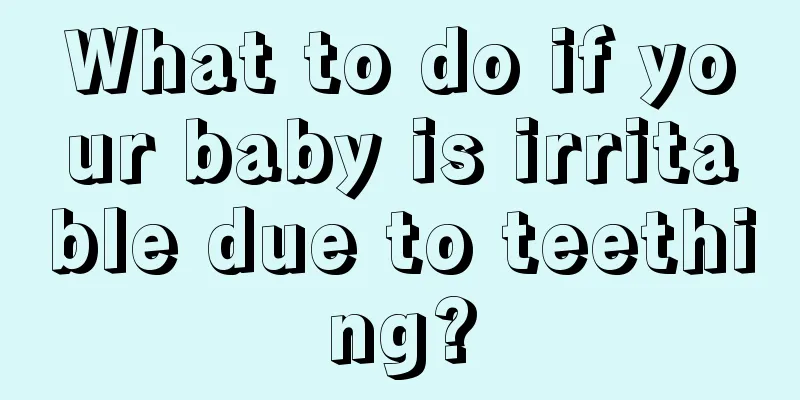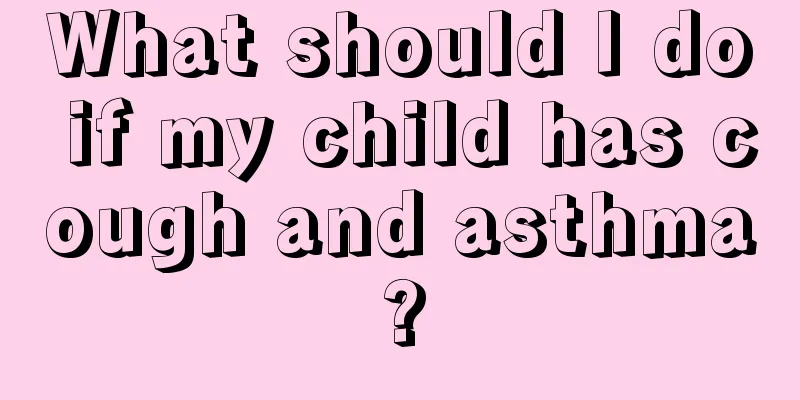What to do if your baby is irritable due to teething?

|
Many parents will find that their babies are always irritable during the teething period, and irritability will bring many adverse effects, such as crying, being naughty, or not wanting to breastfeed, etc. This situation has a huge impact on the baby, so parents need to pay special attention and take timely measures to deal with it. The following is a detailed introduction on what to do if your baby is irritable due to teething? When the baby is restless and chews things, parents may wash their fingers and help the baby massage the gums. At first, the baby may resist a little because of the friction pain, but when the baby finds that this relieves the pain, he will soon calm down and be willing to let parents use their fingers to massage their gums. It takes about 2 years for a baby to grow the first deciduous tooth and all the deciduous teeth to grow out. Basically, a few teeth grow every few months. The following situations are likely to occur when a baby's deciduous teeth grow out: 1. Drooling About 2 months before babies start to grow teeth, most babies will drool or put their hands into their mouths to scratch. If parents carefully examine their baby's mouth, they can see that the gums are partially white or slightly red and swollen, and that the gums feel hard like tooth tips when touched. 2. Mild cough Babies will secrete more saliva during the teething process, and too much saliva can cause babies to feel nauseous or cough. As long as it's not a cold or allergies, there's nothing to worry about. 3. Chewing The biggest characteristic of babies' teething is chewing things. He bites his own hands, his mother's nipples. It can be said that as long as he sees something, he will put it in his mouth and chew it. The purpose is to reduce the pressure of teeth growing under the gums by biting. 4. Pain Pain and discomfort are inevitable during your baby's teething process. The pain is caused by gum inflammation, which is the only way for the soft gum fibers to deal with the approaching teeth. It is especially uncomfortable when the first teeth and molars grow. 5. Irritability As the tooth tip gets closer to the top of the gum, the inflammation becomes more severe and the constant pain makes the baby irritable and restless. |
<<: What foods are good for children with night sweats
>>: Height and weight standards for newborn babies
Recommend
What calcium tablets can increase height?
When it comes to children's growth, calcium i...
Why do children have difficulty falling asleep?
Children often have difficulty falling asleep. In...
What are the taboos when visiting a newborn baby?
After a newborn baby is born, its body is relativ...
What to do if there are small red spots on the newborn's legs
Women who have just become mothers must have many...
What to do if your child curses
Everyone is born like a piece of pure white paper...
What to do if baby's leg lines are asymmetrical
The healthy growth of the baby requires us to obs...
What to do if your child has a fever while teething
When children are changing their teeth, they some...
What is the cause of heel valgus in children?
The healthy development of children is our greate...
Treatment of nosebleeds while babies sleep
The birth of every new life will make our parents...
What is the best treatment for oral thrush in babies?
We all know that babies are particularly suscepti...
What are the symptoms of a baby catching a cold and having a fever?
If there is a baby at home, he or she definitely ...
Why do children grind their teeth and talk in their sleep?
Many babies grind their teeth or talk in their sl...
Symptoms of fever, cold and flu in children
In daily life, if you do not pay attention to mai...
Clinical manifestations of cerebral palsy in children
Cerebral palsy in children is commonly known as c...
What medicine should children take for measles
https://static.cndzys.com/20161114/59af41354329ee...









